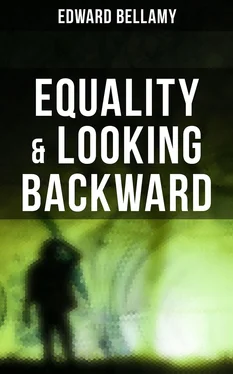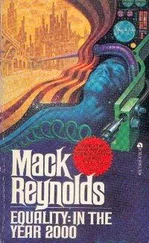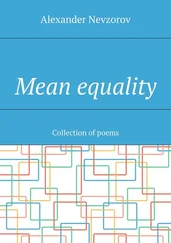Edward Bellamy
Equality & Looking Backward
Published by

Books
- Advanced Digital Solutions & High-Quality eBook Formatting -
musaicumbooks@okpublishing.info
2018 OK Publishing
ISBN 978-80-272-4510-9
Looking Backward: 2000–1887 Looking Backward: 2000–1887 Table of Contents
Equality
Looking Backward: 2000–1887
Table of Contents Table of Contents Looking Backward: 2000–1887 Looking Backward: 2000–1887 Table of Contents Equality
Edward Bellamy
Table of Contents Table of Contents Looking Backward: 2000–1887 Looking Backward: 2000–1887 Table of Contents Equality
Author’s Preface
Chapter 1
Chapter 2
Chapter 3
Chapter 4
Chapter 5
Chapter 6
Chapter 7
Chapter 8
Chapter 9
Chapter 10
Chapter 11
Chapter 12
Chapter 13
Chapter 14
Chapter 15
Chapter 16
Chapter 17
Chapter 18
Chapter 19
Chapter 20
Chapter 21
Chapter 22
Chapter 23
Chapter 24
Chapter 25
Chapter 26
Chapter 27
Chapter 28
Table of Contents
Historical Section Shawmut College, Boston,
December 26, 2000
Living as we do in the closing year of the twentieth century, enjoying the blessings of a social order at once so simple and logical that it seems but the triumph of common sense, it is no doubt difficult for those whose studies have not been largely historical to realize that the present organization of society is, in its completeness, less than a century old. No historical fact is, however, better established than that till nearly the end of the nineteenth century it was the general belief that the ancient industrial system, with all its shocking social consequences, was destined to last, with possibly a little patching, to the end of time. How strange and wellnigh incredible does it seem that so prodigious a moral and material transformation as has taken place since then could have been accomplished in so brief an interval! The readiness with which men accustom themselves, as matters of course, to improvements in their condition, which, when anticipated, seemed to leave nothing more to be desired, could not be more strikingly illustrated. What reflection could be better calculated to moderate the enthusiasm of reformers who count for their reward on the lively gratitude of future ages!
The object of this volume is to assist persons who, while desiring to gain a more definite idea of the social contrasts between the nineteenth and twentieth centuries, are daunted by the formal aspect of the histories which treat the subject. Warned by a teacher’s experience that learning is accounted a weariness to the flesh, the author has sought to alleviate the instructive quality of the book by casting it in the form of a romantic narrative, which he would be glad to fancy not wholly devoid of interest on its own account.
The reader, to whom modern social institutions and their underlying principles are matters of course, may at times find Dr. Leete’s explanations of them rather trite — but it must be remembered that to Dr. Leete’s guest they were not matters of course, and that this book is written for the express purpose of inducing the reader to forget for the nonce that they are so to him. One word more. The almost universal theme of the writers and orators who have celebrated this bimillennial epoch has been the future rather than the past, not the advance that has been made, but the progress that shall be made, ever onward and upward, till the race shall achieve its ineffable destiny. This is well, wholly well, but it seems to me that nowhere can we find more solid ground for daring anticipations of human development during the next one thousand years, than by “Looking Backward” upon the progress of the last one hundred.
That this volume may be so fortunate as to find readers whose interest in the subject shall incline them to overlook the deficiencies of the treatment is the hope in which the author steps aside and leaves Mr. Julian West to speak for himself.
Table of Contents
I first saw the light in the city of Boston in the year 1857. “What!” you say, “eighteen fifty-seven? That is an odd slip. He means nineteen fifty-seven, of course.” I beg pardon, but there is no mistake. It was about four in the afternoon of December the 26th, one day after Christmas, in the year 1857, not 1957, that I first breathed the east wind of Boston, which, I assure the reader, was at that remote period marked by the same penetrating quality characterizing it in the present year of grace, 2000.
These statements seem so absurd on their face, especially when I add that I am a young man apparently of about thirty years of age, that no person can be blamed for refusing to read another word of what promises to be a mere imposition upon his credulity. Nevertheless I earnestly assure the reader that no imposition is intended, and will undertake, if he shall follow me a few pages, to entirely convince him of this. If I may, then, provisionally assume, with the pledge of justifying the assumption, that I know better than the reader when I was born, I will go on with my narrative. As every schoolboy knows, in the latter part of the nineteenth century the civilization of today, or anything like it, did not exist, although the elements which were to develop it were already in ferment. Nothing had, however, occurred to modify the immemorial division of society into the four classes, or nations, as they may be more fitly called, since the differences between them were far greater than those between any nations nowadays, of the rich and the poor, the educated and the ignorant. I myself was rich and also educated, and possessed, therefore, all the elements of happiness enjoyed by the most fortunate in that age. Living in luxury, and occupied only with the pursuit of the pleasures and refinements of life, I derived the means of my support from the labor of others, rendering no sort of service in return. My parents and grand-parents had lived in the same way, and I expected that my descendants, if I had any, would enjoy a like easy existence.
But how could I live without service to the world? you ask. Why should the world have supported in utter idleness one who was able to render service? The answer is that my great-grandfather had accumulated a sum of money on which his descendants had ever since lived. The sum, you will naturally infer, must have been very large not to have been exhausted in supporting three generations in idleness. This, however, was not the fact. The sum had been originally by no means large. It was, in fact, much larger now that three generations had been supported upon it in idleness, than it was at first. This mystery of use without consumption, of warmth without combustion, seems like magic, but was merely an ingenious application of the art now happily lost but carried to great perfection by your ancestors, of shifting the burden of one’s support on the shoulders of others. The man who had accomplished this, and it was the end all sought, was said to live on the income of his investments. To explain at this point how the ancient methods of industry made this possible would delay us too much. I shall only stop now to say that interest on investments was a species of tax in perpetuity upon the product of those engaged in industry which a person possessing or inheriting money was able to levy. It must not be supposed that an arrangement which seems so unnatural and preposterous according to modern notions was never criticized by your ancestors. It had been the effort of lawgivers and prophets from the earliest ages to abolish interest, or at least to limit it to the smallest possible rate. All these efforts had, however, failed, as they necessarily must so long as the ancient social organizations prevailed. At the time of which I write, the latter part of the nineteenth century, governments had generally given up trying to regulate the subject at all.
Читать дальше











